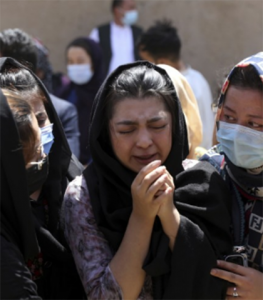Taliban targeting Afghans waiting for Australian visas
Afghans still waiting for Australian visas to allow them to leave the country are being targeted by the Taliban, their families claim.
Several Afghans who recently arrived in Australia as part of the August airlift out of Kabul say they fear for relatives still in Afghanistan.
 One man ‘Abdul’ (not his real name) told iMPACT Magazine that 12 of his immediate family members had been detained by the Taliban or have disappeared and three others – including his wife – are moving from house to house in Kabul every few days to avoid being arrested.
One man ‘Abdul’ (not his real name) told iMPACT Magazine that 12 of his immediate family members had been detained by the Taliban or have disappeared and three others – including his wife – are moving from house to house in Kabul every few days to avoid being arrested.
“My mother is ill in hospital but none of our family members can visit her because they will be arrested by the Taliban if they go there,” ‘Abdul’ said.
“We don’t know what to do. I have applied to bring these three family members to Australia to save them. But we are just waiting to hear about the visas,” he said.
Another man, who was an interpreter for the Australian army, says his brother has been blindfolded, gagged and put in a cell.
“They took him when they found out we had applied for a visa for him to come to Australia,” the man said.
Other reports say Afghans who have applied for Australian humanitarian visas say they are living in fear as the Taliban are “hunting us down like animals”.
Accounts of their experiences under the Taliban regime, including testimonies of beatings, interrogations and threats to family members, have been provided to a Senate inquiry into Australia’s engagement in Afghanistan which began public hearings this week.
One of the accounts tells of a man threatened with execution.
“I believed my life would soon be over. I was so frightened,” he wrote. He was eventually released from custody and is now in hiding, sleeping in a different place every night.
“The Taliban have been calling me every night. They tell me not to try to run away, that wherever I am, even outside of Afghanistan, they will find me,” he wrote.
In another account, a former Afghan national army soldier said he had come out of hiding briefly to “send the papers and identity documents to friends who are helping me apply for a humanitarian visa to Australia”.
“The Taliban say they forgive everyone who has worked with foreigners, or who worked in government or in the army. But in reality, they are hunting us down like animals. I fear we will all be killed in the end,” the man wrote.
There are reports from aid agencies of the Taliban going door-to-door, purportedly to assess humanitarian needs.
But they are using the exercise to search for people on hit lists, the agencies say.
Greens Senator Janet Rice said testimonies were “really heartbreaking and gut-wrenching”.
Sen Rice said the accounts would serve as “very significant evidence” to the inquiry “to cut through the propaganda that has been perpetuated by the Taliban that things are fine and that people are safe”.
“It’s just really sobering to see this is what is happening on the ground to human rights defenders, to Hazara people, to other ethnic minorities,” Sen Rice said.
“People are living in absolute fear for their lives, and from some of the accounts we know that that fear is absolutely justified because they’re being taken in and tortured.”
Sen Rice called on the Australian government to accept at least 20,000 refugees from Afghanistan. The government has reserved 3,000 places within its existing humanitarian intake for this financial year, but has said the number is a base and not a cap.
The Senate’s foreign affairs, defence and trade references committee is investigating how the Australian government should respond to the latest developments in Afghanistan, following the fall of the nation to the Taliban.
The home affairs and defence are among the government departments to be questioned.
The remit of the inquiry includes how to “protect Australian citizens, visa holders, and Afghan nationals who supported Australian forces, where they remain in Afghanistan”.
It will also examine whether Australia’s longest military engagement met the goals set by successive governments, and the adequacy of the preparation for withdrawal.
Labor senator Kimberley Kitching, who chairs the committee, said she believed Australia “was a force for good in Afghanistan” but the inquiry would pursue important questions.
“Australians – especially the brave men and women of the ADF who risked everything and did so much good, our diplomats, and aid workers – want answers to some big questions about our role in Afghanistan,” Sen Kitching said.












